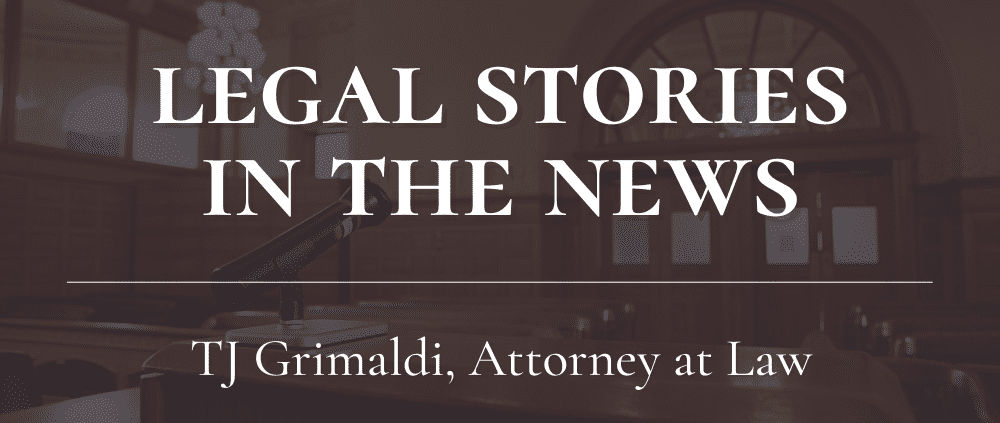Many people abide by COVID-19 social rules. If you test positive for COVID-19, you should stay away from other people to prevent spreading the illness. But, not everybody follows these rules — which leads to questions.
Are the rules really rules? And, can you — or Donald Trump — get in trouble for not following them?
Trump’s COVID-19 Testing Timeline
Late on October 1, 2020, President Donald Trump announced on Twitter that he had tested positive for COVID-19. He began to quarantine and was hospitalized the next day. He seemed to follow the “rules” of protecting others after getting a positive COVID-19 test. But, new accounts tell a different story.
In a new book, former White House chief of staff Mark Meadows revealed that Trump actually tested positive for COVID-19 much earlier than officially announced. Meadows, along with two other sources, say Trump tested positive for COVID-19 on September 26, according to NBC News.
Rather than quarantining after receiving a positive COVID-19 result, Trump held a large event with 150 people in attendance at the White House Rose Garden (to announce the nomination of Supreme Court Judge Amy Coney Barrett) before heading to a campaign rally.
In the following days, he had debate prep sessions with his team, held a press conference, attended a reception for Gold Star families, held two outdoor events at the White House, attended two fundraisers, and most importantly, participated in a Presidential debate with Joe Biden.
Trump participated in all of these activities after receiving a positive COVID-19 test.
Trump’s team claims that after the initial positive test, Trump had a follow-up test that came back negative. They say they believed the positive test to be inaccurate.
So, did Trump break any rules — social, procedural, or legal?
Did Trump Break Any Rules?
Social rules, as guided by the CDC, suggest that you should take a positive test seriously. You should isolate yourself for 10 days “after symptom onset and after resolution of fever for at least 24 hours, without the use of fever-reducing medications, and with improvement of other symptoms.” Trump did not follow these rules if the report by Meadows and others is true.
Procedural rules as they pertain to the presidential debate said each participant needed to test negative for the virus within 72 hours of the debate. If Trump did receive a negative test after his initial positive, he seems to have abided by the debate rules.
Legal rules are more complex. Laws and legal precedent would make it difficult to hold Trump legally liable if he knowingly spread COVID-19.
Related: What Does It Take to Be an Attorney for a High-Profile Case?
A Legal Look at COVID-19 Liability
When looking at the liability and potential consequences of spreading COVID-19 or not following rules and guidelines, you need to consider both civil and criminal charges.
Related: What’s the Difference Between a Civil and Criminal Case?
Civil Matters: In civil matters, when a person’s negligence has led to the harm of one or more individuals, it can lead to a personal injury lawsuit. There are many types of personal injury lawsuits — such as an auto accident or a slip and fall. But, it would be difficult to prove that someone’s negligence caused another person to contract COVID-19.
To sue for personal injury over a case of catching COVID-19 from someone, you would have to prove unequivocally that the defendant gave the plaintiff COVID-19. This fact would be difficult to prove given the high contagion rate of COVID-19.
Criminal: While it is unlikely that a person would face criminal charges if they were accused of infecting one or more people with COVID-19, there are other criminal charges that could be a consequence of not following COVID-19 guidelines.
State and local ordinances gave local governments the power to arrest or fine someone for violating rules related to mask-wearing, social distancing, and quarantining. People across the country faced a range of charges for failing to meet these guidelines. In June 2021, the state of Florida pardoned all Floridians accused of violating local COVID rules.
Related: If You’re Arrested for a Crime, Immediately Take These 6 Steps
Could Trump (or You) Be Liable for Giving Someone COVID?
Even if the story about Trump’s updated COVID-19 testing timeline is true, It is very unlikely that he would face any civil or criminal charges. Proving liability in a case of spreading COVID-19 would be very difficult, and as of now, it isn’t clear he broke any local or state ordinances.
It is unlikely that you will face civil or criminal charges related to your actions if you spread COVID-19. But, as we have seen with COVID-19, things are always changing. If you or someone you know is facing legal charges, civil or criminal, related to COVID-19, talk to a defense attorney right away. Know your rights and get an attorney who can guide you through the process and to the best possible outcome.
Get help today by contacting TJ Grimaldi. With experience in both civil and criminal matters, TJ can help you navigate any charges against you. Get advice today. Schedule your consultation or call 813-226-1023 to talk to TJ.
Photo: (AP Photo/Julio Cortez)
TJ Grimaldi joined McIntyre in 2011. McIntyre recruited TJ to create the divisions of personal injury and family law, as well as to expand the existing criminal defense practice at the firm. During TJ’s tenure at McIntyre, he has helped oversee and grow these practice areas. He continues to practice in these divisions while also expanding his own practice areas to include estate planning and immigration law. TJ is admitted to practice before the Supreme Court of Florida and the United States District Court for the Middle and Southern Districts of Florida.
